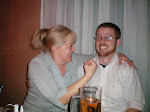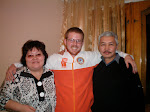Cambodia happened really fast. My journal entries from that week all begin with that statement in some form or another. We took a bus from Trat to Sihanoukville, on the southern coast of Cambodia, but we found out that when traveling you have to be cautious and mentally alert at all times.
Sunday, March 29: Border Crossings and Capital Quiz
Last night in Cambodia. It’s gone by too fast. Cambodia in a nutshell: The border crossing was a pain in a few ways: 1) We had to stay a night in a hotel by the border because of transportation timing and the fact that the border closes for the night and you can’t cross after seven p.m. 2) English speaking guys were waiting for us at the visa registration window and took our passports to fill out the forms for us. We thought they worked for the government and wouldn’t give us any problem, but the just work for tips, asking for money after they’ve filled out your forms. We didn’t pay them, partly because 3) the visa cost $35, not the $20 we had budgeted and 4) I lost $17 to a crappy exchange place in a bazaar. Now I know: Always go to a bank and find out what the conversion rate should be.
Here 4000 rio = $1 USD, and the whole country takes dollar bills. Any change you get is given in rio bills, meaning that for the past week we’ve been operating in a dual-currency system. It’s confusing. Once we got to the beach town of Sihanoukville, things brightened considerably. We sat on the beach, played Frisbee, ate fajitas, had a night of bar-hopping—all great fun. I got to play soccer on the beach, 3v3 with a couple of guys from Argentina, once from Germany and another from England. I’m proud to say I scored three goals for my motherland. I wish we could have stayed a week there. The atmosphere was laid back, and although very touristy, our time there was a nice break from the road.
Phnom Penh was a bit more culturally demonstrative as a Cambodian city. Most service-sector employees speak decent English, the streets are packed with motorcycles and tuk-tuks, and we’ve become accustomed to the bombardment of sales offers everywhere we walk. We’ve dubbed tuk-tuk drivers as tuk-tuk attackers because they wait around the bus station and guesthouses and at the first sight of a tourist begin asking, “Sir, you want a ride? You need tuk-tuk?” “No thanks, we’re walking” They get out of their vehicle. “I’ll take you anywhere. Good price.” “Nope, thanks.” They’ve started walking with you down the street. “Three dollars. I know everywhere in city. We go, ok?” You’ve realized silence may be the best response. “Ok. One dollar. Ok? No problem.” They are convinced beyond doubt that you want, you need a ride in a tuk-tuk regardless of what you might verbally convey to them, regardless of the clarity and firmness with which you convey it. Along with the tuk-tuk attackers come offers for pot, prostitutes (boom-boom), restaurants and night clubs. It’s quite oppressive for an American taught to value independent thought, knowing that he can decide for himself what, if anything, he wants and where he wants to buy it.
The bombardment reached an excruciating peak today at the temples near Siem Reap. We woke up at 4:30 am in order to see the sunrise at the Buddhist temples built by the Khmer civilization in the 1200s. When we arrived at the first temple as the sun was just beginning to color the eastern sky, a flock of kids swarmed us, trying to sell bracelets, postcards, books and trinkets. They were young and barefoot and they knew how to sell. Two dialogues:
8-year old girl: Hello, sir? You buy bracelets, ok?
Aaron: No thank you.
Girl: Only one dollar. It’s good price.
Aaron: One dollar? That’s expensive.
Girl: Ok, ten bracelets for one dollar. Buy one for your girlfriend.
Aaron: I don’t have a girlfriend. Sorry.
Girl: You know why you don’t have girlfriend?
Aaron: Why’s that?
Girl: Because you don’t buy bracelet!
Different girl, same bracelets: Where you from?
Aaron: The US.
Girl: If I tell you the capital of US, you buy bracelet, ok?
Aaron: If I tell you the capital of Cambodia, you’ll go away, ok?
Girl: No. And the capital is Washington DC. No you have to buy. You promised.
Aaron: No I didn’t. And we lied, we’re really from Kazakhstan.
Girl: If I tell you the capital of Kazakhstan you will buy.
Aaron: We’ll see.
Girl: Astana. Now you buy bracelet.
Aaron: I don’t want a bracelet.
Girl: Do you know the capital of New Guinea?
Aaron: No, what?
Girl: I’ll tell you if you buy.
We saw the killing fields with its tower of skulls and the school turned torture prison used by the Khmer Rouge in the 1970s to kill dissidents and intellectuals. It was horrible. If you don’t know about it, read about it HERE.
I also wrote a poem on the bus.
The Road to Siem Reap
My life is scattered with moments I’d like to safely keep
The most recent, the view from a bus along the road to Siem Reap
It’s a flat simple route, but the impression is profound
Of the sun setting behind palms rooted in the red soggy ground
The day is slowly ending and in each little village we pass
people sit under stilted houses, the roofs thatched with grass
This highway is lined with property, only one house deep
One thin long village hugs the road to Siem Reap
A man chases a duck in a pond, as the cattle nearby graze
A woman bathes her daughter in a bucket while her naked son plays
His skin shines like dark copper as he splashes gleefully
His smile and his joy beaming boldly for everyone to see
It seems to me here that life is a bit more complete
In the heat and humidity by the road to Siem Reap
It’s clear from the tools and the land there is work to be done
But life’s pace is slow and there is plenty of time for fun
Little kids play toss with a ball; one throws, another catches
Smiling crowds gather round to watch volleyball matches
I see a world at peace as I drift off to sleep
While the bus tumbles on, down the road to Siem Reap
Subscribe to:
Post Comments (Atom)
.jpg)








No comments:
Post a Comment